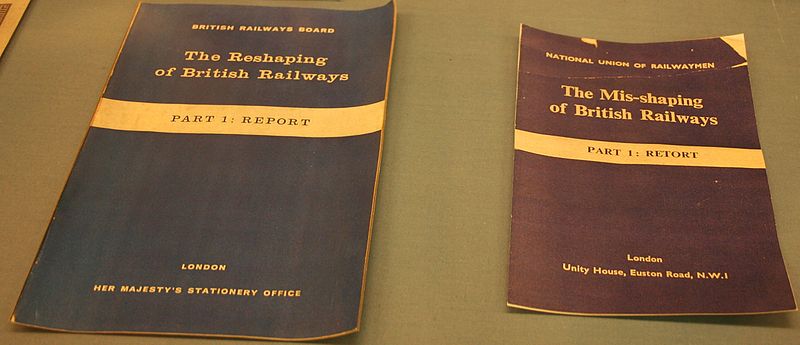Ever the contrarian, Tim Worstall responds to an article calling for the “Beeching Axe” cuts to the British passenger railway network in the 1960s to be reversed:

The British Railways Board’s publication The Reshaping of British Railways, Part 1: Report, Beeching’s first report, which famously recommended the closure of many uneconomic British railway lines. Many of the closures were implemented. This copy is displayed at the National Railway Museum in York beside a copy of the National Union of Railwaymen’s published response, The Mis-shaping of British Railways, Part 1: Retort.
Photo by RobertG via Wikimedia Commons.
For background, as the “Beeching Axe” is far less well-known today than it used to be, here’s Wikipedia’s introduction:
The Beeching cuts (also Beeching Axe) were a reduction of route network and restructuring of the railways in Great Britain, according to a plan outlined in two reports, The Reshaping of British Railways (1963) and The Development of the Major Railway Trunk Routes (1965), written by Dr Richard Beeching and published by the British Railways Board.
The first report identified 2,363 stations and 5,000 miles (8,000 km) of railway line for closure, 55% of stations and 30% of route miles, with an objective of stemming the large losses being incurred during a period of increasing competition from road transport and reducing the rail subsidies necessary to keep the network running; the second identified a small number of major routes for significant investment. The 1963 report also recommended some less well-publicised changes, including a switch to containerisation for rail freight.
Protests resulted in the saving of some stations and lines, but the majority were closed as planned, and Beeching’s name remains associated with the mass closure of railways and the loss of many local services in the period that followed. A few of these routes have since reopened; some short sections have been preserved as heritage railways, while others have been incorporated into the National Cycle Network or used for road schemes; others now are lost to construction, have reverted to farmland, or remain derelict.
Worstall says:
[Dr. Richard] Beeching is one of the most universally hated figures in British politics, yet I have no doubt that he was that rare creature, someone working for the state who actually got things about right.
What Dr Richard Beeching mostly did was a cold, analytical report into the railways and recommended cutting large chunks of it that no-one was using. This was done because the railways were losing a fortune every year. And he mostly got it right. He assumed that we would replace trains with buses, which isn’t a bad idea at all. […]
One of the reasons I think Beeching ended up more right than he thought was the arrival of the car. Yes, cars can be environmentally damaging, cause deaths and so forth. Personally, I lean towards the bus or train as a preference. But you can’t ignore the upsides of cars.
The biggest problems with trains are connection time, flexibility and that there’s no market in there. Rail is quite poor at doing their one job: getting a train from A to B. You’d think after 150 years, they’d have it going pretty good, but crew not turning up, signal failures, electrical failures, doors not closing properly. industrial action are not that rare. The problems are certainly more common than if you drive a Toyota Corolla on the motorway to work. Your driver will turn up (because it’s you), the doors will close, the car will run pretty much perfectly. You also have no connection time in that Corolla. You turn off one road straight onto another. You can also go when you please. Middle of the night, middle of the day.








